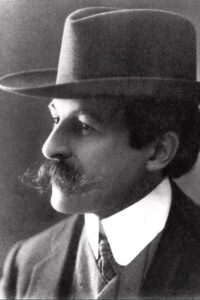
The Teeth of the Tiger
It was half past four; M. Desmalions, the Prefect of Police, was not yet back at the office. His private secretary laid on the desk a bundle of letters and reports which he had annotated for his chief, rang the bell and said to the messenger who entered by the main door:
“Monsieur le Préfet has sent for several people to see him at five o’clock. Here are their names. Show them into separate waiting rooms so they can’t communicate, and let me have their cards when they come.”
The messenger went out. The secretary was turning toward the small door to his room when the main door opened again and admitted a man who stopped and leaned, swaying over the back of a chair.
“Why, it’s you, Vérot!” said the secretary. “But what’s happened? What’s the matter?”
Inspector Vérot was a very stout, powerfully built man with a big neck, shoulders, and florid complexion. He had been upset by some violent excitement, for his face, streaked with red veins and usually so apoplectic, seemed almost pale.
“Oh, nothing. Monsieur le Secrétaire!” he said.
“Yes, yes; you’re not looking your usual self. You’re grey in the face…. And the way you’re sweating….”
Inspector Vérot wiped his forehead and, pulling himself together, said:
“It’s just a little tiredness…. I’ve been overworking myself lately: I was keen on clearing up a case that Monsieur Desmalions had put in my hands. All the same, I have a funny sort of feeling—”
“Will you have a pick-me-up?”
“No, no; I’m more thirsty.”
“A glass of water?”
“No, thank you.”
“What then?”
“I should like—I should like—”
His voice faltered. He looked troubled as if he had suddenly lost his power to utter another word. But he recovered himself with an effort and asked:
“Isn’t Monsieur Desmalions here?”
“No; he won’t be back till five when he has an important meeting.”
Read or download Book
Maurice LeBlanc
Maurice Marie Émile Leblanc (December 11, 1864 – November 6, 1941) was a French novelist and short story writer. He is best known for creating the fictional gentleman thief and detective Arsène Lupin, who is often described as a French counterpart to Arthur Conan Doyle’s Sherlock Holmes.
Biography.
The first Arsène Lupin story appeared in a series of short stories serialized in the Je sais tout, starting in No. 6, dated July 15 1905. Created at editorial request, Leblanc may have also read Octave Mirbeau’s Les 21 jours d’un neurasthénique (1901), which features a gentleman thief named Arthur Lebeau, and he had seen Mirbeau’s comedy Scrupules (1902), whose main character is a gentleman thief.
By 1907, Leblanc had graduated to writing full-length Lupin novels, and the reviews and sales were so good that Leblanc effectively dedicated the rest of his career to working on the Lupin stories. Like Conan Doyle, who often appeared embarrassed or hindered by the success of Sherlock Holmes and seemed to regard his success in crime fiction as a detraction from his more “respectable” literary ambitions, Leblanc also appeared to have resented Lupin’s success. Several times, he tried creating other characters, such as private eye Jim Barnett but eventually merged them with Lupin. He continued to pen Lupin tales well into the 1930s.
Leblanc also wrote two notable science fiction novels: Les Trois Yeux (1919), in which a scientist makes televisual contact with three-eyed Venusians, and Le Formidable Evènement (1920), in which an earthquake creates a new landmass between England and France. Leblanc was awarded the Légion d’Honneur for his services to literature and died in Perpignan in 1941. He was buried in the Montparnasse Cemetery. Georgette Leblanc was his sister.
Life
Maurice Leblanc was the second child of Émile Leblanc, a 34-year-old ship-owner merchant, and of Mathilde Blanche (née Brophy), daughter of rich dyers, aged 21 and was delivered by Achille Flaubert, Gustave Flaubert’s brother. He had an elder sister, Jehanne (born in 1863), and a younger sister, Georgette Leblanc (born in 1869), who, from 1883 until the 1920s, was an actor and star operatic soprano. During the Franco-German War of 1870, his father sent Maurice to Scotland. Upon his return to France, he completed his studies in Rouen. The young Maurice received his first education in a free institution, the Patry Pension. Then, from 1875 to 1882, he completed his secondary studies at the Lycée Corneille. As a teenager, he frequently encountered Gustave Flaubert and Guy de Maupassant.
Refusing the career his father intended for him at a card factory, Maurice headed to Paris in 1888 to pursue writing instead. First a journalist, then a novelist and storyteller. His first novel, “Une femme” (A Woman), published in 1893, was very successful and was followed by other works, such as “Des Couples” (The Couples), “Voici des Ailes” (Here Are Wings) and his only play, “La pitié”, released in 1902, which is a failure, causing him to give up the theatre for a while. In 1901, he published “L’Enthousiasme”, an autobiographical novel.
In 1905, Pierre Lafitte, the director of the monthly Je sais tout, commissioned a short story from Leblanc in the vein of A.J Raffles by Ernest William Hornung and the adventures of Sherlock Holmes. The resulting “L’Arrestation d’Arsène Lupin” (The Arrest of Arsène Lupin) was a great public success. Two years later, the book Arsène Lupin, Gentleman Burglar was released, containing the first nine stories depicting the character published in the French magazine ‘Je sais tout’. The following book, Arsène Lupin versus Herlock Sholmes, a second collection of Arsène Lupin stories written by Maurice Leblanc, angered the Sherlock Holmes creator Conan Doyle, who saw Leblanc’s Herlock Sholmes and Wilson as parody characters designed to ridicule Doyle’s work.
Maurice Leblanc received the Legion of Honor on January 17, 1908, presented by then Under-Secretary of State for Fine Arts, Étienne Dujardin-Beaumetz. While a supporter of French radical socialists and free-thinker in his early age, Leblanc became more bourgeois during the First World War. Leblanc would start to grow weary of writing Arsène Lupin stories. As early as 1910, he tried to kill his hero in the story “813” but would resurrect the character in The Crystal Stopper.






